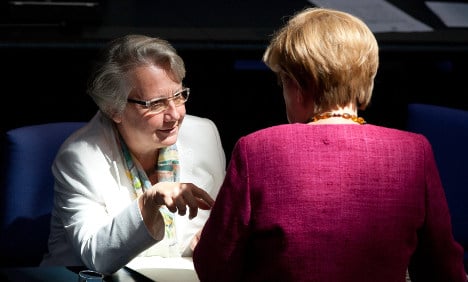Speaking on Wednesday during a trip to South Africa, Schavan said, “I will not accept the decision of Düsseldorf University and will appeal against it. Considering the legal conflict, I ask for your understanding that I will not make any further statements today.”
The university decided on Tuesday evening after a lengthy period of consultation to strip her of the doctorate she got in 1980 for her thesis “Person and Conscience”. Technically she now only has her Abitur qualification – the German equivalent of British A levels – as she did not take a separate degree but proceeded directly to her doctorate.
She immediately came under intense pressure to resign her ministerial job, with many commentators comparing her case with that of Karl-Theodor zu Guttenberg who resigned from his defence minister job in 2011 after it was found he had copied large chunks of his doctoral thesis.
Schavan is a close political ally of Chancellor Angela Merkel, who faces re-election this September and could do without losing a senior colleague.
Opposition politicians are keen to portray her as a liability for Merkel and spent much of Tuesday evening and Wednesday calling for her resignation, particularly in view of her position as minister for education and research.
German media were a little more forgiving.
The Süddeutsche Zeitung said Schavan’s case was a borderline one – as demonstrated by the length of time it took the university to check it. “The misconduct of the current minister was more than 30 years ago. One should have taken all of this into account, have reprimanded her for the poor quotes and have been able to leave it at that.”
The paper said that with Guttenberg and Schavan, Merkel’s government has a plagiarist rate of 12.5 percent – nearly as high as the share of pages in Schavan’s doctoral thesis that were erroneous.
“The decision against Schavan sets strict standards, also for the checking of dissertations that have long been mouldering away in libraries. It may be exciting to see who many titles will fall victim to these standards,” the paper concludes.
The Berliner Zeitung said, “It is already clear that the decision does not only hit the academic reputation of Frau Schavan. An education minister who is found out to have plagiarised parts of her dissertation can hardly remain in office.”
But the paper added that the academics at Düsseldorf University, who did not bring in external examiners to look at the thesis, would also become part of the political discussion. It also said that although it is undisputed that Schavan’s work has serious academic errors, a new examination of it more than 30 years later with massive consequences for her career is questionable at the least. “If this concerned a crime it would have long exceeded the statute of limitations,” the paper said.
The Leipziger Volkszeitung pointed out that Schavan had set the bar high when she had weighed in publicly on the Guttenberg case, criticising his plagiarism. “She must now be measured against that. Angela Merkel who delayed for a long time in the Guttenberg plagiarism affair can hardly afford, at the start of the federal election campaign, to hold onto a struggling minister.”
The Local/DPA/hc




 Please whitelist us to continue reading.
Please whitelist us to continue reading.
Member comments